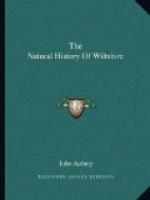The river Thames, as it runnes to Cricklad, passes by Ashton Kaynes; from whence to Charleton, where the North Avon runnes, is about three miles. Mr. Henry Brigges (Savilian professor of Geometrie at Oxford) observing in the mappe the nearnesse of these two streames, and reflecting on the great use that might accrue if a cutt were made from the one to the other (of which there are many examples in the Low Countreys), tooke a journey from Oxford to view it, and found the ground levell and sappable and was very well pleased with his notion; for that if these two rivers were maried by a canal between them, then might goods be brought from London to Bristow by water, which would be an extraordinary convenience both for safety and to avoid overturning. This was about the yeare 1626. But there had been a long calme of peace, and men minded nothing but pleasure and luxury.
“Jam
patimur longæ pacis mala, sævior armis
Luxuria
incumbit."- Lucan.
+ [If Aubrey was right in the preceding paragraph in regarding the stream which rises at “Cubberley” in Gloucestershire as the source of the Thames, he is wrong in stating that “the Thames” passes by Ashton Keynes. It is the other brook, from Kemble, which runs through that village; and the two streams only become united at Cricklade, which is some distance lower down, to the eastward of Ashton Keynes.- J. B.]
Knowledge of this kind was not at all in fashion, so that he had no encouragement to prosecute this noble designe: and no more done but the meer discovery: and not long after he died, scilicet Anno Domini 1631, January 31st.; and this ingeniose notion had died too and beene forgotten, but that Mr. Francis Mathew, (formerly of the county of Dorset, a captain in his majestie King Charles I. service), who was acquainted with him, and had the hint from him, and after the wars ceased revived this designe. Hee tooke much paines about it; went into the countrey and made a mappe of it, and wrote a treatise of it, and addressed himselfe to Oliver the Protector, and the Parliament. Oliver was exceedingly pleased with the designe; and, had he lived but a little longer, he would have had it perfected: but upon his death it sank.
After his Majesties restauration, I recommended Captain Mathew to the Lord Wm. Brouncker, then President of the Royall Societie, who introduced him to his Majestie; who did much approve of the designe; but money was wanting, and publick-spirited contributions; and the Captain had no purse (undonn by the warres), and the heads of the Parliament and Counsell were filled with other things.- Thus the poor old gentleman’s project came to nothing.




